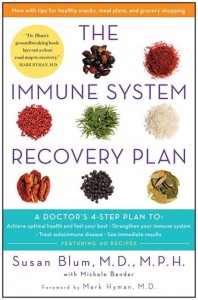
By Susan Blum, MD
If you have gas or bloating after you eat, or if you experience constipation and/or loose stools, or any type of intestinal discomfort, you have a problem with how your gut is functioning. While this is commonly labeled irritable bowel syndrome, or IBS, the diagnosis doesn’t tell you why you’re having this problem.
Usually, the issue is something called dysbiosis, which means your gut flora isn’t healthy. You might have an overgrowth of harmful bacteria, yeast or parasites, or you might not have enough of the good stuff: those probiotics you find in yogurt and cultured foods.
But who cares about a little gas or bloating?
Your gut flora needs to be fixed, because the symptoms you’re having could just be the tip of the iceberg. A whopping 70% of your immune system is located in your gut and if the flora are out of balance, you have an increased risk of something called Leaky Gut Syndrome, and this can lead to autoimmune disease.
Here are my tips to heal your gut, which will treat your symptoms and keep your immune system happy, too.
- For your digestive symptoms, find out whether or not you’ve got food sensitivities, which could be causing the problem. Check yourself for gluten and dairy by removing them both from your diet at the same time for three weeks, and then reintroduce each one at a time, four days apart.
- For your flora, eat cultured food every day, like coconut or almond milk yogurt and kefir, sauerkraut or kimchee, and consider taking a probiotic supplement.
- If the above doesn’t do the trick, consider a gut-cleansing program using herbs like berberine or oregano to remove the harmful microbes. Our new HealMyGut program will help you do just that!




 When you feel anxious or stressed, your adrenals glands secrete cortisol-the stress hormone-into your blood stream to help your body cope. One of the effects of cortisol is to shift blood flow in the body to where it’s needed most. This, in effect, takes blood away from the digestive organs – because fighting off those lions (real or metaphorical), becomes more important than digesting your last meal! Cortisol also has a direct effect on the developing immune system that lies along the intestinal wall, and a direct effect on the gut flora. When stress goes on too long, your flora and gut-immune system can become damaged, and this is one of the triggers for autoimmunity. Another issue is that when you’re stressed, your digestive function suffers, affecting the release of digestive enzymes and gastric acid, and this in turn also changes the balance of your gut flora, and the health of the gut lining. When you are chronically stressed over time, the gut lining is less able to regulate which substances move through it into the body, often leading to a condition called “leaky gut”, or in scientific terms, increased gut permeability. So, substances that were never meant to enter the body actually do, filtering through the immune tissues surrounding the gut, setting off immune reactions that can result in autoimmunity. Now you can see the big connection between stress, gut health and autoimmunity. You can help to heal the gut by decreasing the stress response through meditation, conscious breathing, rhythmic gentle movement, a walk in nature, or any quieting activity that gives you the “Ahhhhh……” response. Even 10 minutes of daily practice can make a difference in turning off the stress chemistry. If you need some support in one of these practices, consider trying our
When you feel anxious or stressed, your adrenals glands secrete cortisol-the stress hormone-into your blood stream to help your body cope. One of the effects of cortisol is to shift blood flow in the body to where it’s needed most. This, in effect, takes blood away from the digestive organs – because fighting off those lions (real or metaphorical), becomes more important than digesting your last meal! Cortisol also has a direct effect on the developing immune system that lies along the intestinal wall, and a direct effect on the gut flora. When stress goes on too long, your flora and gut-immune system can become damaged, and this is one of the triggers for autoimmunity. Another issue is that when you’re stressed, your digestive function suffers, affecting the release of digestive enzymes and gastric acid, and this in turn also changes the balance of your gut flora, and the health of the gut lining. When you are chronically stressed over time, the gut lining is less able to regulate which substances move through it into the body, often leading to a condition called “leaky gut”, or in scientific terms, increased gut permeability. So, substances that were never meant to enter the body actually do, filtering through the immune tissues surrounding the gut, setting off immune reactions that can result in autoimmunity. Now you can see the big connection between stress, gut health and autoimmunity. You can help to heal the gut by decreasing the stress response through meditation, conscious breathing, rhythmic gentle movement, a walk in nature, or any quieting activity that gives you the “Ahhhhh……” response. Even 10 minutes of daily practice can make a difference in turning off the stress chemistry. If you need some support in one of these practices, consider trying our